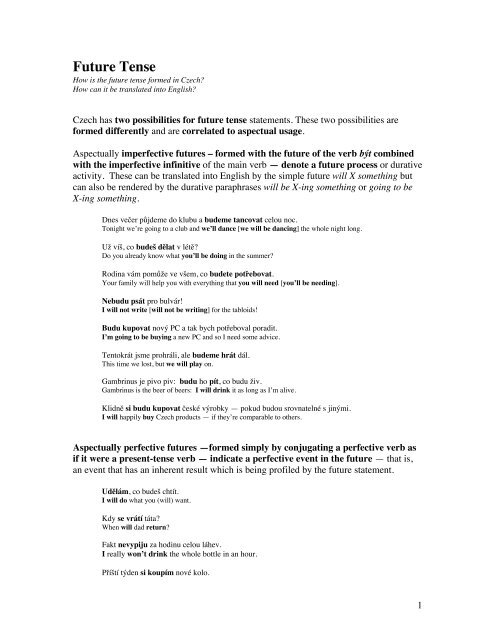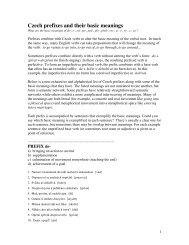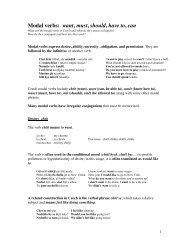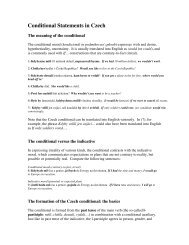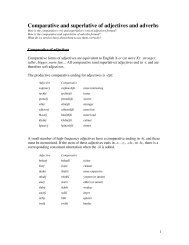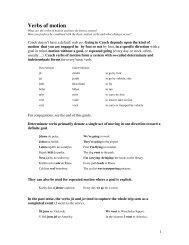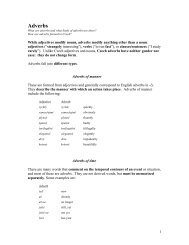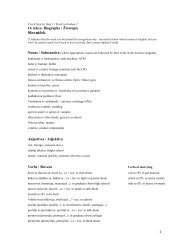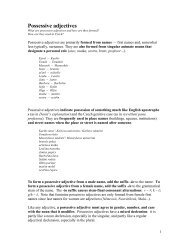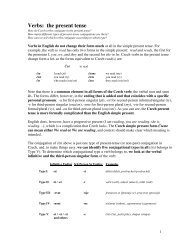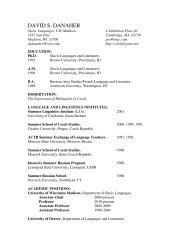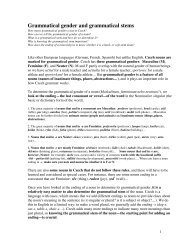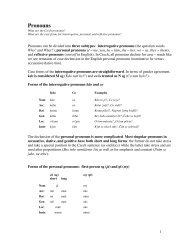Future Tense - Cokdybysme.net
Future Tense - Cokdybysme.net
Future Tense - Cokdybysme.net
Create successful ePaper yourself
Turn your PDF publications into a flip-book with our unique Google optimized e-Paper software.
<strong>Future</strong> <strong>Tense</strong><br />
How is the future tense formed in Czech<br />
How can it be translated into English<br />
Czech has two possibilities for future tense statements. These two possibilities are<br />
formed differently and are correlated to aspectual usage.<br />
Aspectually imperfective futures – formed with the future of the verb být combined<br />
with the imperfective infinitive of the main verb — denote a future process or durative<br />
activity. These can be translated into English by the simple future will X something but<br />
can also be rendered by the durative paraphrases will be X-ing something or going to be<br />
X-ing something.<br />
Dnes večer půjdeme do klubu a budeme tancovat celou noc.<br />
Tonight we’re going to a club and we’ll dance [we will be dancing] the whole night long.<br />
Už víš, co budeš dělat v létě<br />
Do you already know what you’ll be doing in the summer<br />
Rodina vám pomůže ve všem, co budete potřebovat.<br />
Your family will help you with everything that you will need [you’ll be needing].<br />
Nebudu psát pro bulvár!<br />
I will not write [will not be writing] for the tabloids!<br />
Budu kupovat nový PC a tak bych potřeboval poradit.<br />
I’m going to be buying a new PC and so I need some advice.<br />
Tentokrát jsme prohráli, ale budeme hrát dál.<br />
This time we lost, but we will play on.<br />
Gambrinus je pivo piv: budu ho pít, co budu živ.<br />
Gambrinus is the beer of beers: I will drink it as long as I’m alive.<br />
Klidně si budu kupovat české výrobky — pokud budou srovnatelné s jinými.<br />
I will happily buy Czech products — if they’re comparable to others.<br />
Aspectually perfective futures —formed simply by conjugating a perfective verb as<br />
if it were a present-tense verb — indicate a perfective event in the future — that is,<br />
an event that has an inherent result which is being profiled by the future statement.<br />
Udělám, co budeš chtít.<br />
I will do what you (will) want.<br />
Kdy se vrátí táta<br />
When will dad return<br />
Fakt nevypiju za hodinu celou láhev.<br />
I really won’t drink the whole bottle in an hour.<br />
Příští týden si koupím nové kolo.<br />
1
Next week I’m going to buy myself a new bike.<br />
Vždycky mě zajímalo jen to, co napíšu zítra.<br />
Only one thing has ever interested me: what I will write tomorrow.<br />
Titul vyhraje Sparta.<br />
Sparta will win the title.<br />
Because perfective futures usually concretize an event, they often require specificity<br />
while imperfective futures tend to be more general. Note the difference in usage in<br />
the following questions: the first is general, and the second is concrete. The first uses an<br />
imperfective future, and the second a perfective future with a direct object that gives the<br />
inquiry a definite grounding in a specific future event.<br />
Co budeš dělat<br />
What will you do [will you be doing]<br />
Uděláš to<br />
Will you do it<br />
Below is a comparison of the future-tense possibilities using the verb dělat<br />
(imperfective) / udělat (perfective).<br />
Imperfective future Perfective future<br />
(já) budu dělat udělám<br />
(ty) budeš dělat uděláš<br />
(on/ona) bude dělat udělá<br />
(my) budeme dělat uděláme<br />
(vy) budete dělat uděláte<br />
(oni/ony) budou dělat udělají<br />
Note that future forms of být (I will be, you will be, s/he will be…) only require the<br />
future conjugation of být (budu, budeš, bude…) — that is, they do not require an<br />
infinitive.<br />
Budeme doma za půl hodinky.<br />
We’ll be home in a half-hour.<br />
Budeš ve škole nebo v práci<br />
Will you be at school or work<br />
Modal verbs — like moci/moct (to be able to, can), muset (must, need to), chtít (want),<br />
mít (should, have to) — only take imperfective future forms.<br />
2
Nevím, co budeš moct dělat.<br />
I don’t know what you will be able to do.<br />
Dám ti to, co budeš chtít.<br />
I’ll give you what you (will) want.<br />
Dneska se budu muset učit.<br />
Today I’ll have to study.<br />
3


